- Home
- J. -H. Rosny aîné
The Givreuse Enigma Page 14
The Givreuse Enigma Read online
Page 14
Already, the first mastiff was attacking the wild beast’s throat, while the other five made for its flanks and thighs. The battle was obscure, atrocious and formidable. The enormous body of the tiger, the muscular torsos of the dogs, the seven ferocious mouths, rolling in a frantic mêlée, punctuated by snarls and furious gasps…
One of the dogs went down; another projected from two yards away, immediately resumed the attack; red springs opened wide. The tiger, clawed and bitten, occasionally shook off the stubborn pack, but nothing could prevail against the obstinacy of animals more warlike than all the brutes of the forest, the savannah and the sea.
“It’s prodigious!” Frédéric exclaimed, while one of the six dogs, its entrails streaming over the ground like reptiles, and two legs half-detached from its body, blinded by scarlet fluid, opened up a passage into the tiger’s belly with one final effort…
The dog died with its head literally plunged inside the cat, which stumbled, while the fire in its yellow eyes became duller and two red holes were hollowed out in its throat.
“It’s finished!” Hendrik concluded, contentedly.
The tiger only got up again heavily and awkwardly, its extended claws raking empty air, almost blind in the fog of its commencing death-throes. It collapsed, its flanks palpitating feebly. The dogs resumed tearing it apart.
Once more, the sovereign beast stood up, in the stupor of defeat and impotence, then fell slowly back with a dull exhalation of breath, and died.
The men howled with delight.
II. The Man with the Mastiffs
The horses continued their frantic flight. Hendrik had taken up the reins again, in vain; the maddened animals remained insensible to the bit. Although it was broad, low-slung and well-equilibrated, there was a danger that the cart might overturn.
Hendrik, however, spoke to the beasts in a soft and serious voice: “Vos! Zwarte! Hy is dood… Stil! Stil! Stil!”17
The cart oscillated like a ship in a storm. The Sumatran, thrown on to the bench, collided with Frédéric, and the Sino-Indian uttered a groan, while the cart, plowing into a large bush, came to a standstill. Trembling on their legs, snorting and panting, the exhausted horses were pulling desperately, but when the Sumatran had thrown covers over their heads they calmed down almost immediately.
“They’ll be manageable within three minutes,” affirmed the Dutchman.
In the moonlight, the dogs were still harassing the cadaver. A man of short stature, exceedingly stout, with thick legs, advanced toward them.
“That’s Jan Cats,” said Hendrik, “Jufvrouw de Gavres’ kennel-master.”18
Jan stopped next to the tiger and examined his dogs. One of them, flat on the ground, would not see the light again; a second was scarcely any better off, and all the rest bore some wounds…
While the Sino-Indian driver saw to the horses, Hendrik, Frédéric and Corisande went to join the man with the mastiffs. Young Hendrik addressed the man in Dutch. “They fought like heroes, Jan.”
“It’s in their blood,” Jan replied, and, having bowed respectfully, resumed his careful examination. “He is well-defended, in his fashion. Beasts and men are what they are. A fine tiger, Mynheer—but he was dealing with the best dogs in the world!” He shook his head sadly. “Poor Leeuw is dead—he’s the one that led the attack. Duyvel’s hanging by a thread…but the others seem almost unharmed—scratches. Those four still have strength enough to defeat a second tiger. All the same, the mistress will be sad…but I couldn’t let Christians—including a de Ritter!—be killed. No, I couldn’t.”
The cart came back slowly, the horses led by the driver and the Sumatran.
“Would you mind, Heer Hendrik, if I saw to Duyvel now…and Leeuw too?”
“Our saviors! I should think so, Jan. Come on!”
Hendrik helped to carry Duyvel, who looked at the humans with an extraordinary expression, having scarcely uttered a complaint, in his rude courage. His belly was open; blood was running from the nape of his neck; the thrust of a claw had opened the skin of his skull all the way to the nostrils.
“Do you think he’ll have the same valor, if he recovers?” asked Hendrik.
“The same valor!” Jan riposted, indignantly. “Be sure that he’ll be as ready for battle as he would if he’d never sustained a scratch. It’s the tiger that would never have started again. And yet, the tiger…”
They arrived at the caravanserai. A large gate with two battens was wide open. Surrounded by high walls, the courtyard preceded a large house, a primitive stable and a shed serving as a coach-house.
“A building from the old days!” Hendrik said to the Frenchman. “It’s solid; it’ll last enough two centuries—and now that the country has become dangerous again, following the earthquake and the floods, one is very glad to find such a refuge on one’s route!”
The Sino-Indian and the native took care of stabling the horses. Jan, aided by Hendrik, transported the wounded dog into a low-ceilinged room in which two candles were burning. He examined the wounds more attentively.
“I think he’ll be able to pull through,” he said.
He took a few improvised instruments from a square box, along with a stout needle and a reel of hempen thread. Then, having pushed the entrails back in, he sewed up the dog’s abdomen.
“Temporary,” he said. “I always have what’s necessary for the beasts, and even for men.”
After unhooking a lamp quite similar to the lamps of olden days, Hendrik assured himself that it contained oil, and lit it. “The beds are only heaps of dry grass,” he said, “but there are blankets in the cart for the Jufvrouw. Apart from the main hall, there are a few bedrooms…or, one should rather say, a few cells. Excuse us! I believe we can go by the occidental route.”
He spoke softly, having become timid again. In this primitive place, by the yellow light of the lamp and the candles, the young woman seemed to be a creature of luxury, harmony and splendor. Hendrik was not insensible to feminine grace, but he had not a single impure thought.
“We’ll be fine!” she said.
He admired the delicate gestures and elegance of the daughters of France, but he was not one of those men who was immediately submissive to sharp impressions; he needed time.
“Aren’t you hungry?” he asked Frédéric, not daring to ask Corisande.
“It’s only two hours since we ate.”
Hendrik went to get a box from the cart that contained bread, ham, cheese and beer. Having spread these provisions on a granite table, he soon demonstrated that the excitement had had a considerable effect on his appetite.
Jean Cats came to join him. He set about eating too, but it was the remains of a meal interrupted by the tiger. Besides, for reasons of deference, he sat at a different table from the young Dutchman. They both ate religiously.
“There’s no need to be astonished, Heer Hendrik,” Jan said, “if other vermin are prowling around the vicinity. The earthquake and the floods have chased out many dirty beasts…and I’m told that there were several black tigers in the forest. There’s also been mention of brigands. A farm has been pillaged and the inhabitants burned alive. We’re living in dark times.”
Hendrik did not think he ought to pass on this information to the young French people. “We’re safe for tonight,” he said, “and tigers sleep by day.”
“If they’re not hungry!” Jan Cats retorted. “The four dogs can still demolish one, but against four, it’s rare for a tiger not to kill three before dying. The Grafina will be very sorry…she loves her dogs.”
Frédéric and Corisande were listening. Jan amused them, with his face as wide as the face of a hippopotamus and the surprising breadth of his torso. He had eyes the color of soda, faintly tinted with violet; his voice, almost ventral, sounded like the voice of a trombone.
“Why does the Grafina breed these dogs?” Hendrik asked. “She can put a bullet in a tiger’s eye at 100 paces. That’s more economical than getting dogs killed. It seems to me that retrieve
rs are worth better than that.”
“She likes that sort of thing, Heer Hendrik—as I do. She likes handsome fighting buffaloes, the fastest racing pigeons, big grayhounds capable of chasing down a deer…I’m like the Lady, no disrespect intended.” Jan took a large swig of beer and went on: “If Duyvel recovers, all will be well!”
For politeness’ sake, Frédéric and Corisande had accepted a glass of beer. Hendrik thought that it would not be courteous to prolong the conversation with Cats. He turned to the young woman and explained: “I’m gathering information, Mademoiselle. In the wake of the cataclysms, there have been changes in the terrain—and we’re talking about Comtesse Louise de Gavres.”
“But that’s a French name,” said Corisande.
“It is a French name. The Gavres’ came to Holland after the dragonnades of your Louis XIV.19 Later, a Gavres emigrated here. It’s now a mixed family, but Comtesse Louise hasn’t forgotten her origins or her native tongue. The Gavres’ have always spoken it. As I’ve told you, she is, along with my father, the best shot on the island. A tiger is no more redoubtable to her than a panther or a boar!”
“It’s rather humiliating, in these forests, to be a poor shot!” said Frédéric, with a hint of bitterness. He was robust, courageous, and animated by a spirit of adventure; the vain role he had played during the tiger’s pursuit still rankled.
Corisande was listening as one listens to fairy tales.
“You’re right,” said Hendrik. “I’ll take lessons from my father…doubtless you’ll do the same.”
“Is Mademoiselle de Gavres still young?” Corisande asked.
“She’s only 23, Mademoiselle.”
After what Corisande had seen from the cart, a woman for whom a tiger was not redoubtable seemed a legendary creature.
Having finished his snack, Hendrik said: “You must be tired?”
“I don’t know,” Frédéric replied.
“Nor me,” said Corisande, laughing. “But as you say, we must be.”
An hour later, the men and animals in the caravanserai were sleeping in the midst of the carnivorous expanse. In every part of the forest, beasts with phosphorescent eyes, sharp canines and trenchant claws were in search of the creatures that were to surrender their living flesh and warm blood. Desperate flights, gasps of terror and cries of agony mingled with the infinite rustle of branches and the hoarse cries of the victors…
It was a night to which the Ages were indifferent; billions of creatures trembled and died in this manner in the ancestral forests, and billions of avid throats cried out in the same way. Sicut erat in principio, et nunc, et semper, et in saecula saeculorum!20
The dogs woke the travelers an hour before dawn. The Moon, very low in the sky, shone weakly, and was beginning to take on an orange tint. The barking of the dogs was furious and continuous.
Jan got up first, then Hendrik and Frédéric.
“What’s happening?” asked the young Dutchman.
“Something serious,” Cats retorted. “Our dogs know how to distinguish between animals and, at the end of the day, there’s only one that’s capable of putting them into such a rage.”
“A tiger?”
“Yes, a tiger. And men…but to excite them like that, they’d have to be prowling round the caravanserai! If they were only passing by, the dogs would content themselves with a brief serenade. We’ll go and see!”
Hendrik translated these words for the young French couple, while Jan made a tour of the Refuge. The façade, like the surrounding wall, had no windows; a few narrow loopholes replaced them.
“Men?” said Frédéric. “What men?”
“In this region there are only Malays, who are always untrustworthy. Those who remain quiet for years can suddenly devote themselves to savage deeds. The Malays here are, moreover, the most excitable of their kind. I don’t think that we have anything to fear, though.”
Jan had just come back. “I wasn’t mistaken,” he said. “Two splendid tigers have invaded the valley.”
“After the one yesterday evening, that’s incredible!”
“Everything’s been turned upside-down, Heer Hendrik. Would you like to see?”
Hendrik and Frédéric followed the dog-handler. Through one of the loopholes they made out formidable silhouettes. One was no more than 300 meters from the Refuge, the other some 200 meters further away.
“What can they do?” the Frenchman asked.
“Nothing now, but we have a day’s journey to make. With them, one never knows. They could soon be far away…they might also come back unexpectedly. It’s a male and a female…”
“Let’s try to kill them!”
“We could—but I fear that it would be a waste of ammunition.”
Frédéric looked at the tigers, feeling a return of the humiliated anger that he had experienced in the cart, on realizing his impotence. He would have admired their redoubtable strength had he been able to fight, but the thought that he was like a defenseless animal continued to exasperate him.
He went in search of his rifle and, having carefully taken aim at the nearer tiger, fired three shots in quick succession. The bullet passed over and to one side of the astonished tiger, which growled dully. Beside himself, the young man tried to rectify his aim; this time, the bullets seemed to bury themselves in the ground 20 or 30 meters in front of the wild beast. Even if they had attained the correct distance, a slight rightward deviation would have rendered them harmless.
“I give up!” he exclaimed, resentfully.
“You might as well!” said Hendrik. “That’s six bullets that might have been useful in a fight at close quarters, or at point-blank range.”
The enraged dogs continued barking, and the male tiger, vaguely disturbed by the presence of invisible beings, retreated into a thicket, into which the tigress soon followed him.
Jan Cats, who had witnessed the scene, concluded: “It would take eight of our dogs to tackle them—four for each beast. When there are only four dogs, the tiger generally kills three before going down. At daybreak, I’ll inform the mistress.”
“How?” asked Hendrik.
“By pigeon! Whenever I go away I bring a few fine travelers of the Antwerp variety—the best in the world!”
“What’s the purpose of informing the Grafina?”
“Firstly to let her know what’s happening. Then, she’ll be glad to know that there are tigers in these parts. I’ll wager ten stuyvers to a florin that she’ll come to our aid. That’s the kind of woman she is.”
“Should we wait for her?”
“I’ll wait for at least half a day, myself. The pigeons can cover 50 kilometers in an hour. They’ll arrive quickly; the mistress will be at home…it only takes three hours on horseback. She has the finest horses. That’s five hours, at the most, to wait after sunrise. Why don’t you wait too?”
Hendrik, thinking that there would be an inconvenience in remaining in the caravanserai for half a day, turned to Frédéric and told him about Cats’ proposal.
Corisande had arrived. The story excited her. “Do you think she’ll come alone?” she asked.
“With one or two dogs,” said Jan, when Hendrik had translated the question. Not mastiffs—hunting-dogs, from which no beast can conceal its presence, either by night, in a thicket or underground!”
“Ah!” said Frédéric, pensively.
The day did not take long to break; hardly had the dawn sketched its light when the fiery red orb rose over the forest. Jan went to fetch a brown canvas sack, at the bottom of which was a wooden board. He plunged his hand into it and withdrew a large pigeon, colored like a ring-dove, with orange eyes. A silky rainbow set a gloss upon its round throat and black stripes cut across its wings; its entire body was quivering.
Corisande looked at it approvingly, and Jan, full of pride, said: “Even an eagle can’t fly faster! Would you like to hold her for a moment, Heer Hendrik?”
Hendrik gripped the bird carefully, and Cats brought out a second, slimmer
creature with a paler underbelly and a less iridescent throat. “She’s no less agile, and has no less stamina.” He fixed the ring that he had prepared. “Hup! On your way…”
The beautiful birds flew upwards with a flutter of wings, circled momentarily in the sky, and, having determined their route, disappeared.
“No sea-dog, armed with his compass, can orient himself like those pigeons.”
“Now we wait,” Hendrik concluded, with the phlegmatic patience of his race.
III. The Horsewoman of the Wilderness
Li-Wang artfully served the coffee, milk, honey and warm bread. In the garden, the plants were growing hectically, so rapidly that their life was perceptible; the stems thrust upwards from the ground avidly, and the flowers throbbed like beating hearts.
Li-Wang was as furtive as a serpent, and every gesture revealed a balanced and skillful meticulousness. The Grafina’s footsteps scarcely caused him to raise his head, but he pricked up his ears like a wolf.
Louise de Gavres emerged into the light, a tall woman with flexible hips and a fine, ardent head. The daughter of a brown-haired race, her vast and commanding eyes were that opaque black color that extinguishes light. She was beautiful in body, seductive of face, harmonious in her movements and resistant to stress. Dressed in white, with a short skirt, she was reminiscent of Artemis the huntress. Any weapon would have suited her, even if she had had scarcely practiced with it.
Her gaze caressed the garden. Then she opened a very old Bible bound in pigskin and read, with a grave, almost emphatic joy: “Who is this that cometh from Edom, with garments dyed red; that man glorious in his apparel, traveling in the greatness of his strength?”21
She repeated the ancestral gesture, and the history of the Pastors of the Desert, the Exile, the cold Netherlands, and the first virgin forest, came to her from the depths of time. She remembered, still full of rancor toward those who had subjected her family to the dragonnades—and she retained an indignation against France, mingled with affection.

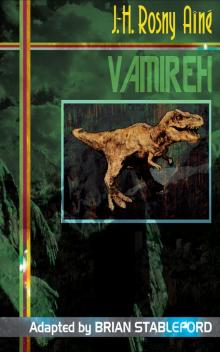 Vamireh
Vamireh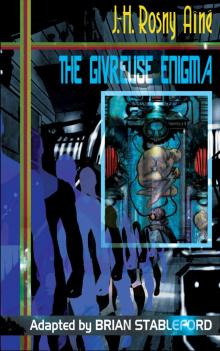 The Givreuse Enigma
The Givreuse Enigma Three Science Fiction Novellas: From Prehistory to the End of Mankind
Three Science Fiction Novellas: From Prehistory to the End of Mankind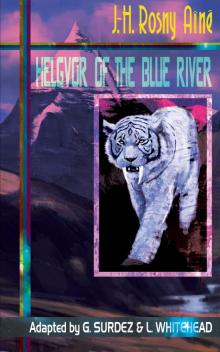 Helgvor of the Blue River
Helgvor of the Blue River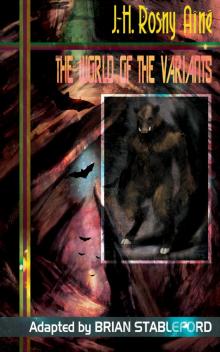 The World of the Variants
The World of the Variants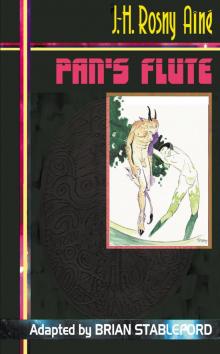 Pan's Flute
Pan's Flute The Navigators of Space
The Navigators of Space The Mysterious Force
The Mysterious Force